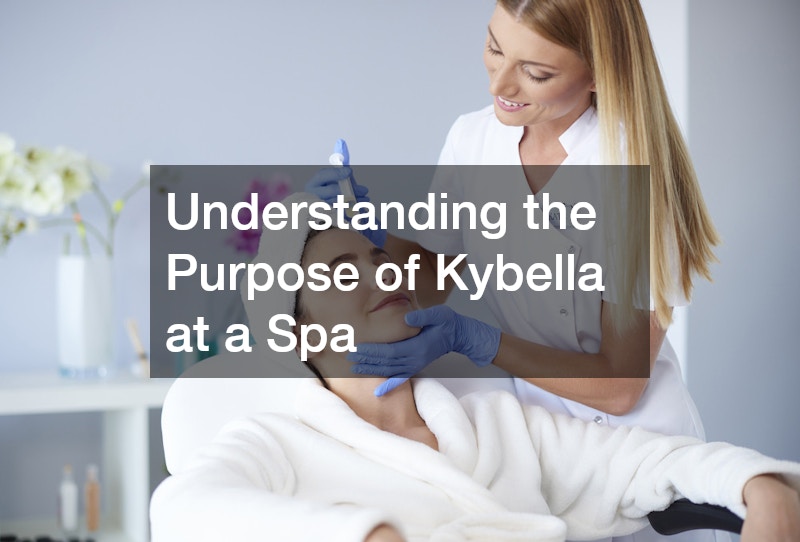Understanding the Purpose of Kybella at a Spa

The use of aesthetic treatments has grown significantly over the past few years, with Kybella becoming a popular choice for reducing submental fat, often referred to as a double chin. In this article, we aim to provide a comprehensive understanding of how Kybella is utilized at a spa, addressing the effectiveness, procedure, and aftercare involved. This will aid readers in making informed decisions about whether Kybella is the right choice for their aesthetic goals.
What is Kybella?
Definition and Composition
Kybella is an FDA-approved injectable treatment that contains deoxycholic acid, a naturally occurring molecule in the body that aids in the breakdown and absorption of dietary fat. It is specifically designed to target and destroy fat cells, which are then naturally processed and eliminated by the body.
Patients often choose Kybella for its innovative approach to reducing unwanted fat, particularly in the submental area. The use of deoxycholic acid in Kybella is what makes it effective for those looking to non-surgically improve their chin profile.
As a scientifically-backed treatment, Kybella’s status as an FDA-approved option reinforces trust in its safety and effectiveness. It’s increasingly becoming an integral part of many aesthetic treatment offerings at spas.
How Kybella Works
Upon injection, Kybella destroys fat cells under the chin, resulting in a noticeable reduction in fullness and an improved profile without surgical intervention. The destruction of fat cells by Kybella is a gradual process that complements the body’s natural metabolic functions.
Each treatment is designed to target the specific submental fat area, with the results being both gradual and significant over time. Patients often notice visible improvements after a few sessions, with the number of treatments varying based on individual needs.
The procedure is precise, focusing solely on the fat cells, meaning other surrounding tissues remain unaffected. This specific targeting is why Kybella is praised for minimizing risks and ensuring safety.
Why Choose Kybella Over Other Treatments?
Non-Surgical Benefits
Kybella offers a non-invasive alternative to surgical procedures like liposuction, with minimal downtime and less risk associated with the treatment. This non-surgical approach allows individuals to resume their normal activities shortly after the session.
In contrast to surgical methods that often require anesthesia and recovery time, Kybella provides a more accessible treatment option. Many people prefer it because it avoids the inherent risks of surgery while still delivering effective results.
The treatment’s appeal lies in its simplicity and the convenience it affords those looking for non-invasive solutions. By opting for Kybella, individuals can achieve their aesthetic goals without the need for long recuperation periods.
Customization and Precision
The treatment can be tailored to the specific needs of each patient, providing a customized approach that targets and treats specific areas of fatty tissue. Such customization allows for greater precision in addressing the unique characteristics of each individual’s chin profile.
During the pre-treatment assessment, practitioners map out the exact areas for injection, ensuring the focus is precisely where it is needed. This tailored technique enhances the effectiveness of each session.
Practitioners and patients collaborate closely to create a personalized treatment plan that aligns with specific aesthetic goals. This level of customization is one of the primary reasons why Kybella stands out among other treatments.
What to Expect During a Kybella Appointment?
Pre-Treatment Consultation
A one-on-one consultation with a licensed practitioner is essential to discuss treatment goals and assess the chin area. This consultation is the first step in determining if Kybella is the appropriate option for the patient.
During this meeting, practitioners evaluate the amount of submental fat and discuss possible outcomes and expectations. This dialogue is crucial in ensuring patients have realistic expectations before proceeding.
The consultation also provides an opportunity to discuss any medical concerns or allergies that might impact the treatment. Ensuring patient safety and comfort is a priority throughout the Kybella journey.
The Injection Process
Detailing the step-by-step procedure of Kybella injections, including the use of topical anesthesia and the duration of the session. Typically, sessions last 15-20 minutes, making it a convenient option for those with busy schedules.
Practitioners apply a grid-like pattern to identify injection sites, ensuring an even distribution of Kybella for consistent results. This systematic approach within each session ensures fat reduction is achieved with accuracy.
The process involves minimal discomfort, thanks to the application of topical anesthesia before injection. Patients can expect temporary swelling, but can return to normal activities shortly afterward.
Possible Side Effects and Risks of Kybella
Common Side Effects
An exploration of typical side effects, such as swelling, bruising, or numbness near the injection site, which are generally mild and temporary. Most patients report that these effects subside within a few days to a week after treatment.
These common side effects are part of the body’s natural response to the breakdown of fat cells. While temporary, they often indicate that the treatment is working as intended.
Open communication with the practitioner about any unusual reactions is important, though serious side effects are rare. Ensuring patient awareness contributes to a more positive treatment experience.
Minimizing Risks
The importance of selecting a qualified and experienced professional to conduct the treatment cannot be overstated, as credentials ensure a higher level of care. Patients are encouraged to research and select licensed practitioners to ensure safe and effective treatment.
Adhering to post-treatment guidelines is also critical in reducing potential adverse reactions. Following instructions regarding care and activity levels post-procedure helps in achieving optimal healing.
Through informed choices and diligence in selecting the right provider, patients can significantly minimize the associated risks. This proactive approach leads to enhanced outcomes and satisfaction.

